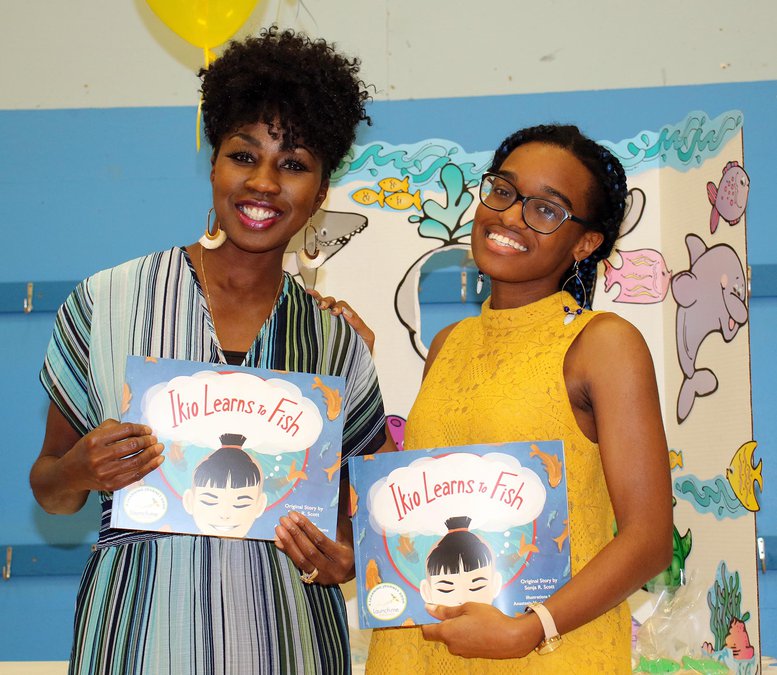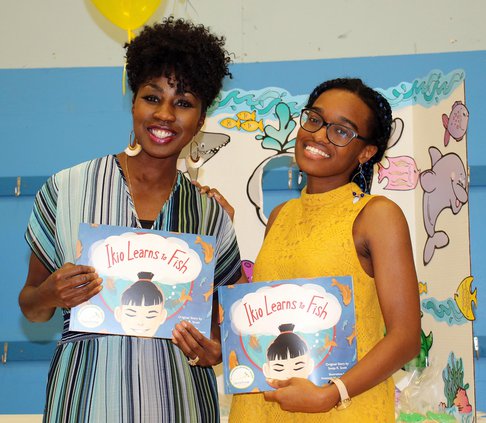We need to use different metacognitive and learning strategies to teach kids.Sonja Scott
RINCON — Sonja Scott wants children, teachers and parents to understand that learning isn’t a one-way street. There are many ways to get to the desired educational destination, she said.
“Every child has a unique learning journey,” said Scott, author of Ikio Learns to Fish. “We need to use different metacognitive and learning strategies to teach kids.”
Metacognition is awareness or analysis of one’s own learning or thinking processes. In that vein, Scott’s first self-published book features a variety of animal characters that reflect traits that impact learning.
“For example, I use a fox to represent strategies,” she said. “I use a bear to represent relentlessness and I use a swan to represent peacefulness, like contemplative thinking.
“When you tell a child to pretend to be those animals in different tasks, you are helping them to frame the task in ways that their thinking will facilitate success.”
Scott, a local educator, motivational speaker, youth minister and entrepreneur, hopes area school systems, nonprofit organizations and community groups will use her book. She conducted a book signing at the Effingham YMCA on Saturday.
“The goal is to offer not just a book, but workshops, because of my education background,” Scott said. “I can do them for parents, teachers and students, and they can be customized.”
Ikio Learns to Fish is the tale of on young angst-filled Japanese boy from Edo period. It is time for him to learn how to fish like his father but he is afraid and insecure. His ultimately teaches him how to fish and grow as a person.
The book is tailored to young children but metacogition is important at all educational levels, Scott said.
“Colleges teach it but this is a way a four year old can think, ‘Oh, I am going to be like a swan when I am reading my book because I need to contemplate and I don’t need to be loud and moving around. I need to sit on the bean bag,’” she explained. “That is called framing your learning.”
Scott said Ikio, like many young children, is prone to letting his imagination run wild.
“He’s like, ‘Oh, the sea monster’s going to get me,’” she said. “We have kids who say, ‘Oh my gosh! My thoughts are swirling!’ So you are teaching children to put a picture with their feelings.”
Scott said it is important for children to be able to verbalize what is bothering them.
“That helps you in the future to know what is going on,” she said. “If they can’t verbalize, you are going to be guessing at what is the matter. Sometimes they are angry and they don’t know how to say it.
“Even adults have that problem.”
Scott admitted she even wrestles metacognition issues. She identifies most with the relentless bear.
“That is my normal modality of thinking,” she said. “Sometimes I need to be the swan and this is my first line of defense. We can teach children to switch modalities.”
The learning methods explored in Scott’s book can be used in many activities, she said.
“It’s all about the teachers and parents being aware that they can use that language on anything,” Scott said. “That’s a lifelong message.”
Scott dedicated the book to her youngest son, Isaiah. She described the excellent South Effingham High School student as “a reluctant learner.”
“I had to figure out how to get him excited about learning,” she said.
To increase the book’s impact, Scott has included questions and talking points to facilitate discussion. The questions are similar to the kind used on standardized tests.
“These aren’t what I call memory and recall questions,” Scott said. “This is going to help you child be prepared at an early age for what is required with standardized testing.”
The book even includes vocabulary assistance with the Japanese words that are included in it.
Ikio Learns to Fish is beautifully illustrated by Anastasia Magliore Williams.
“I wanted to present a product that was excellent by hiring the best of the best of SCAD graduates,” Scott said. “It was not an inexpensive task, by any means, but I wanted a product that any mother, parent or teacher could pick up and readily identify that time was taken to do this. That’s the kind of comments that I have received.”
Scott wrote Ikio Learns to Fish more than eight years ago while doing graduate work at Armstrong Atlantic State University. The obligations of raising children delayed its publication until recently.
The new author found Williams two and a half years ago through a random internet search.
“I didn’t know anybody,” Scott said. “I typed in ‘SCAD’ and ‘illustrator’ and all these profiles came up. I reached out to Ana through email and within three weeks we were partners.
“Ana is the ‘shero’ because she said, ‘yes!’”
Scott and Williams, who studied art in Hong Kong and penned her own children’s book, worked well together because their visions were similar. They quickly agreed on every detail, including Ikio’s hairstyle.
“We never actually met until January of this year,” said Scott, who had a face-to-face encounter with Williams for only the second time during Saturday’s book signing. “We were working via email, phone and Skype.”
Williams’ artistic style is suited perfectly for Scott’s book. She was meticulous in her efforts to make the artwork adequately reflect Japanese culture and the Edo period.
“I definitely wanted to make it happen for her,” Williams said. “I am honored that I could be the person she chose and found.”
Scott is in the middle of a 30-day book launch that features numerous book signings and media appearances.
“It’s been going so well,” Scott said. “The support has been tremendous.”
Scott’s husband, Roger, is happy that her book has finally come to fruition.
“She teaches Ikio how to fish in her sleep,” he joked.
The book costs $14.95. Copies can be purchased by contacting Scott through Facebook or at sonjarscott.com.
They are also available at Largesse Boutique.








